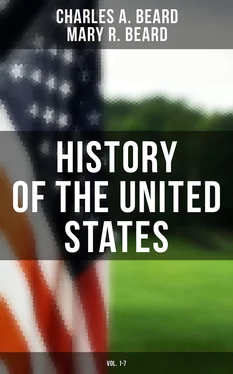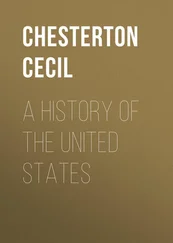1 ...7 8 9 11 12 13 ...31 The Church of England.—Virginia was the stronghold of the English system of church and state. The Anglican faith and worship were prescribed by law, sustained by taxes imposed on all, and favored by the governor, the provincial councilors, and the richest planters. "The Established Church," says Lodge, "was one of the appendages of the Virginia aristocracy. They controlled the vestries and the ministers, and the parish church stood not infrequently on the estate of the planter who built and managed it." As in England, Catholics and Protestant Dissenters were at first laid under heavy disabilities. Only slowly and on sufferance were they admitted to the province; but when once they were even covertly tolerated, they pressed steadily in, until, by the Revolution, they outnumbered the adherents of the established order.
The Church was also sanctioned by law and supported by taxes in the Carolinas after 1704, and in Georgia after that colony passed directly under the crown in 1754—this in spite of the fact that the majority of the inhabitants were Dissenters. Against the protests of the Catholics it was likewise established in Maryland. In New York, too, notwithstanding the resistance of the Dutch, the Established Church was fostered by the provincial officials, and the Anglicans, embracing about one-fifteenth of the population, exerted an influence all out of proportion to their numbers.
Many factors helped to enhance the power of the English Church in the colonies. It was supported by the British government and the official class sent out to the provinces. Its bishops and archbishops in England were appointed by the king, and its faith and service were set forth by acts of Parliament. Having its seat of power in the English monarchy, it could hold its clergy and missionaries loyal to the crown and so counteract to some extent the independent spirit that was growing up in America. The Church, always a strong bulwark of the state, therefore had a political rôle to play here as in England. Able bishops and far-seeing leaders firmly grasped this fact about the middle of the eighteenth century and redoubled their efforts to augment the influence of the Church in provincial affairs. Unhappily for their plans they failed to calculate in advance the effect of their methods upon dissenting Protestants, who still cherished memories of bitter religious conflicts in the mother country.
Puritanism in New England.—If the established faith made for imperial unity, the same could not be said of Puritanism. The Plymouth Pilgrims had cast off all allegiance to the Anglican Church and established a separate and independent congregation before they came to America. The Puritans, essaying at first the task of reformers within the Church, soon after their arrival in Massachusetts, likewise flung off their yoke of union with the Anglicans. In each town a separate congregation was organized, the male members choosing the pastor, the teachers, and the other officers. They also composed the voters in the town meeting, where secular matters were determined. The union of church and government was thus complete, and uniformity of faith and life prescribed by law and enforced by civil authorities; but this worked for local autonomy instead of imperial unity.
The clergy became a powerful class, dominant through their learning and their fearful denunciations of the faithless. They wrote the books for the people to read—the famous Cotton Mather having three hundred and eighty-three books and pamphlets to his credit. In coöperation with the civil officers they enforced a strict observance of the Puritan Sabbath—a day of rest that began at six o'clock on Saturday evening and lasted until sunset on Sunday. All work, all trading, all amusement, and all worldly conversation were absolutely prohibited during those hours. A thoughtless maid servant who for some earthly reason smiled in church was in danger of being banished as a vagabond. Robert Pike, a devout Puritan, thinking the sun had gone to rest, ventured forth on horseback one Sunday evening and was luckless enough to have a ray of light strike him through a rift in the clouds. The next day he was brought into court and fined for "his ungodly conduct." With persons accused of witchcraft the Puritans were still more ruthless. When a mania of persecution swept over Massachusetts in 1692, eighteen people were hanged, one was pressed to death, many suffered imprisonment, and two died in jail.
Just about this time, however, there came a break in the uniformity of Puritan rule. The crown and church in England had long looked upon it with disfavor, and in 1684 King Charles II annulled the old charter of the Massachusetts Bay Company. A new document issued seven years later wrested from the Puritans of the colony the right to elect their own governor and reserved the power of appointment to the king. It also abolished the rule limiting the suffrage to church members, substituting for it a simple property qualification. Thus a royal governor and an official family, certain to be Episcopalian in faith and monarchist in sympathies, were forced upon Massachusetts; and members of all religious denominations, if they had the required amount of property, were permitted to take part in elections. By this act in the name of the crown, the Puritan monopoly was broken down in Massachusetts, and that province was brought into line with Connecticut, Rhode Island, and New Hampshire, where property, not religious faith, was the test for the suffrage.
Growth of Religious Toleration.—Though neither the Anglicans of Virginia nor the Puritans of Massachusetts believed in toleration for other denominations, that principle was strictly applied in Rhode Island. There, under the leadership of Roger Williams, liberty in matters of conscience was established in the beginning. Maryland, by granting in 1649 freedom to those who professed to believe in Jesus Christ, opened its gates to all Christians; and Pennsylvania, true to the tenets of the Friends, gave freedom of conscience to those "who confess and acknowledge the one Almighty and Eternal God to be the creator, upholder, and ruler of the World." By one circumstance or another, the Middle colonies were thus early characterized by diversity rather than uniformity of opinion. Dutch Protestants, Huguenots, Quakers, Baptists, Presbyterians, New Lights, Moravians, Lutherans, Catholics, and other denominations became too strongly intrenched and too widely scattered to permit any one of them to rule, if it had desired to do so. There were communities and indeed whole sections where one or another church prevailed, but in no colony was a legislature steadily controlled by a single group. Toleration encouraged diversity, and diversity, in turn, worked for greater toleration.
The government and faith of the dissenting denominations conspired with economic and political tendencies to draw America away from the English state. Presbyterians, Quakers, Baptists, and Puritans had no hierarchy of bishops and archbishops to bind them to the seat of power in London. Neither did they look to that metropolis for guidance in interpreting articles of faith. Local self-government in matters ecclesiastical helped to train them for local self-government in matters political. The spirit of independence which led Dissenters to revolt in the Old World, nourished as it was amid favorable circumstances in the New World, made them all the more zealous in the defense of every right against authority imposed from without.
Religion and Local Schools.—One of the first cares of each Protestant denomination was the education of the children in the faith. In this work the Bible became the center of interest. The English version was indeed the one book of the people. Farmers, shopkeepers, and artisans, whose life had once been bounded by the daily routine of labor, found in the Scriptures not only an inspiration to religious conduct, but also a book of romance, travel, and history. "Legend and annal," says John Richard Green, "war-song and psalm, state-roll and biography, the mighty voices of prophets, the parables of Evangelists, stories of mission journeys, of perils by sea and among the heathen, philosophic arguments, apocalyptic visions, all were flung broadcast over minds unoccupied for the most part by any rival learning.... As a mere literary monument, the English version of the Bible remains the noblest example of the English tongue." It was the King James version just from the press that the Pilgrims brought across the sea with them.
Читать дальше












